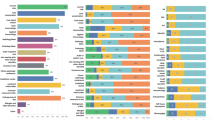Abstract
The aims are to assess whether medical students are interested in rheumatology as a training post during post-medical-school and prior to specialty training that is covered by foundation years (FY) training in the UK, to determine the time spent in the undergraduate training in rheumatology and whether the desire for musculoskeletal (MsK) medicine training (rheumatology and orthopaedics taken together) is enhanced during FY training and to analyse the rationale behind their choice for rheumatology alone or combined with orthopaedics. An online questionnaire was distributed to all 31 UK medical schools, addressed to fourth-, fifth- and sixth-year medical students. The questionnaire was completed by 256 students from 11 of 31 medical schools existed in the UK in 2009. Most respondents (n = 156; 60.9 %) received 3 weeks (96 h) exposure to rheumatology, whilst one-fifth (n = 53; 20.7 %) had received no exposure in rheumatology. A total of 122 students of the 256 that responded (47.6 %) would like to do rheumatology as part of their training and 116 (45.3 %) would like to have more posts available in rheumatology. However, when asked to choose 6 specialties, out of 21, which would be most useful for post-university training, rheumatology was amongst the bottom three, attracting only 9.4 % of respondent students. A total of 68 of 256 (26.5 %) students, however, expressed a desire for MsK medicine: 44/256 (17.1 %) for orthopaedics and 24/256 (9.4 %) for rheumatology. From a total of 49 of 256 (19.1 %) open-ended responses obtained, 25 (51 %) were from those medical students willing to have exposure in MsK medicine: 15 of 44 (34 %) willing to have orthopaedics and 10 of 24 (41.6 %) willing to have rheumatology. Analysis of the responses revealed that it is mostly the specialty choice that guides towards specialty training. One in five of the medical students responded to had received (actual or perceived) no exposure to rheumatology during their undergraduate years. Career choice that derived mostly from undergraduate exposure is the driving force behind medical students’ choice for foundation year training.
Similar content being viewed by others
References
Lambert TW, Goldacre MJ, Edwards C, Parkhouse J (1996) Career preferences of doctors who qualified in the United Kingdom in 1993 compared with those of doctors qualifying in 1974, 1977, 1980 and 1983. BMJ 313:19–24
The Foundation Programme. Available URL: http://www.foundationprogramme.nhs.uk/pages/home. Accessed on: 24/09/09
Programme Search: FP2010. The UK Foundation Programme Organisation (UKFPO). Available URL: https://www.application.mmc.nhs.uk/cgi-bin/programme_criteria.cgi?caid=20.1294.1257634668. Accessed on: 02/11/09
Modernising Medical Careers. Career framework explained. Available URL: www.mmc.nhs.uk/download_files/what%20is%20changing%20at%20mmc.pdf
Dunkley I, Filter A, Speden D, Bax D, Crisp A (2008) Why do we choose rheumatology? Implications for future recruitment-results of the 2006 UK Trainee Survey. Rheumatology 47:901–906
Freedman KB, Bernstein J (2002) Educational deficiencies in musculoskeletal medicine. J Bone Joint Surg Am 84:604–608
Scott I (2007) Why medical students switch careers. Changing course during the preclinical years of medical school. Can Fam Physician 53:94–95
McCarthy EM, Sheane BJ, Cunnane G (2009) Greater focus on clinical rheumatology is required for training in internal medicine. Clin Rheumatol 28:139–143
Kay LJ, Deighton CM, Walker DJ, Hay EM (2000) Undergraduate rheumatology teaching in the UK: a survey of current practice and changes since 1990. Rheumatology 39:800–803
Jandial S, Rapley T, Foster H (2009) Current teaching of paediatric musculoskeletal medicine within UK medical schools-a need for change. Rheumatology 48:587–590
Kolasinski SL, Bass AR, Kane-Wanger GF, Libman BS, Sandorfi N, Utset T (2007) Subspecialty choice: why did you become a rheumatologist? Arthritis Care Res 57:1546–1551
Goldacre MJ, Turner G, Lambert TW (2004) Variation by medical school in career choices of UK graduates of 1999 and 2000. Med Educ 38:249–258
Acknowledgments
We would like to acknowledge all the educational supervisors from the medical schools mentioned who made this survey available to the students and to all the students who took the time to respond and take part in this national UK survey. We would also like to acknowledge Kate Grayson for providing statistical advice.
Conflict of interest
None.
Author information
Authors and Affiliations
Corresponding author
Rights and permissions
About this article
Cite this article
Thapper, M., Roussou, E. Medical students’ attitude towards rheumatology training at foundation years’ level in the UK and rationale behind the students’ choice: results from a national survey. Rheumatol Int 33, 933–938 (2013). https://doi.org/10.1007/s00296-012-2482-5
Received:
Accepted:
Published:
Issue Date:
DOI: https://doi.org/10.1007/s00296-012-2482-5



